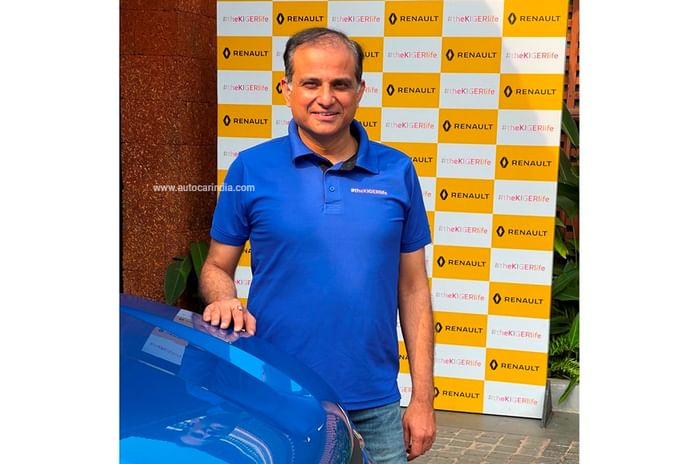The Renault Kiger made its market debut earlier this month at a price of Rs 5.45-9.55 lakh (introductory, ex-showroom, India). Being one of the latest contenders in a closely fought segment that sees competition from the Kia Sonet, Hyundai Venue, Maruti Suzuki Vitara Brezza and many more, Renault had to ensure a distinctive proposition. And the automaker is trying to deliver by targeting the Kiger at more than just the compact SUV category. “It’s a unique positioning because we are looking at the entire B-segment – not just the SUV, but also the hatches,” said Sudhir Malhotra, vice president, sales and marketing, Renault India, in an interview with Autocar India.
- At an introductory starting price of Rs 5.45 lakh, Kiger is the most affordable compact SUV
- Kiger expected to also draw in buyers from the hatchback segment
- Renault has a sales network of more than 500 showrooms
Renault gunning for a share of the B-hatchback market pie
Commenting on the potential volumes, Malhotra said, “We find much larger growth coming into the compact SUV segment. So, it could be that a lot of hatch buyers might upgrade and migrate into this.”
Burgeoning sales of the compact SUV category show that aspiration for the body type has sky-rocketed over the years. As such, it has the potential to draw buyers from other segments, which is something that Renault is trying to tap into with the keenly-priced Kiger. “Everybody would like to upgrade up to an SUV, and the Kiger serves as a very good option for prospective hatchback buyers to upgrade to,” added Malhotra.

Sudhir Malhotra, VP, sales and marketing, Renault India: Everybody would like to upgrade up to an SUV, and the Kiger serves as a very good option.
With a starting price of Rs 5.45 lakh, the sub-four metre Kiger undercuts all the similarly-sized premium hatchbacks, including the Tata Altroz, Maruti Suzuki Baleno, Honda Jazz and the Hyundai i20, thereby opening an all-new set of customers for Renault. What also helps is the fact that the company doesn’t have a direct contender in the B-hatchback territory, which has allowed it to position the Kiger aggressively without the risk of cannibalising sales – a convenience not enjoyed by some of its rival brands.
“With the Kiger, we're looking at straddling both ends of the B-segment. Obviously, we are looking at the B-SUV buyers, but at the same time, the positioning is such that it should also give us a share of the pie of the B-hatchback contenders,” mentioned the company sales and marketing head.
However, this could lead to some intense sibling rivalry, with Nissan also looking to expand beyond the traditional SUV space with its Magnite.
Design, features and performance to differentiate Kiger from rivals
Unlike most of its rivals, the Kiger gets a sloping roofline, and also visually bears a familial connection to the Kwid. Describing the company’s efforts to make the newcomer stand out, Malhotra commented, “We tried to create a differentiated offering. So, it is not just stunning outside, it’s smart inside and sporty to drive.”
The Kiger’s interior is well laid out, with plenty of thoughtful storage spaces. Cabin roominess is also decent. The equipment list is pretty impressive for the price point, with the highlights being the digital instrument cluster, wireless Android Auto and Apple CarPlay compatibility and a wireless charger (available as an official accessory). The all-important sunroof, however, has been omitted.
Powertrain choices include a pair of 1.0-litre petrols – a 72hp, naturally aspirated unit and a 100hp, turbocharged mill. The latter is down on power by 20hp, compared to similar offerings on the Venue and Sonet, and also misses out on a sporty DCT gearbox. However, with a lighter kerb weight, the Kiger promises much by the way of performance.
Renault network primed for Kiger sales
With the Kiger poised to attract a new set of buyers to the Renault family, the French automaker has been working on strengthening its retail footprint in the country. Malhotra mentioned that the automaker added “120 showrooms in the last year itself” despite the lockdown.
The recent expansion has also seen Renault increasing its focus on the rural market. “Today, we stand at 500-plus showrooms, and we've supplemented these outlets with service support coming in from our workshop-on-wheels. So, almost every touch point now has a facility for aftersales as well,” he said.
Also see:
2021 Renault Kiger review, test drive
2021 Renault Kiger video review
Renault Kiger price, variants explained





.jpg?w=234&h=156&q=90&c=1)


Comments
Member Login
Personal Details
No comments yet. Be the first to comment.